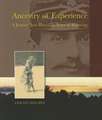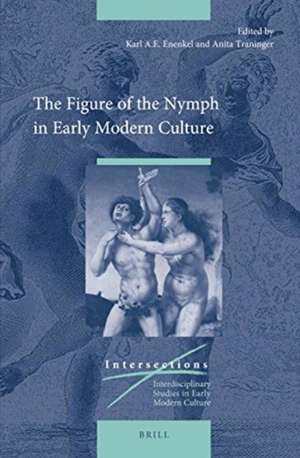The Figure of the Nymph in Early Modern Culture: Intersections, cartea 54
Karl A. E. Enenkel, Anita Traningeren Limba Engleză Hardback – 21 mar 2018
Contributors: Barbara Baert, Mira Becker-Sawatzky, Agata Anna Chrzanowska, Karl Enenkel, Wolfgang Fuhrmann, Michaela Kaufmann, Andreas Keller, Eva-Bettina Krems, Damaris Leimgruber, Tobias Leuker, Christian Peters, Christoph Pieper, Bernd Roling, and Anita Traninger.
Din seria Intersections
-
 Preț: 215.61 lei
Preț: 215.61 lei -
 Preț: 200.26 lei
Preț: 200.26 lei -
 Preț: 154.86 lei
Preț: 154.86 lei -
 Preț: 192.18 lei
Preț: 192.18 lei -
 Preț: 98.61 lei
Preț: 98.61 lei -
 Preț: 217.51 lei
Preț: 217.51 lei -
 Preț: 116.09 lei
Preț: 116.09 lei - 18%
 Preț: 1074.49 lei
Preț: 1074.49 lei -
 Preț: 241.64 lei
Preț: 241.64 lei -
 Preț: 241.64 lei
Preț: 241.64 lei -
 Preț: 228.96 lei
Preț: 228.96 lei -
 Preț: 229.55 lei
Preț: 229.55 lei -
 Preț: 241.64 lei
Preț: 241.64 lei -
 Preț: 226.67 lei
Preț: 226.67 lei -
 Preț: 107.21 lei
Preț: 107.21 lei -
 Preț: 208.79 lei
Preț: 208.79 lei -
 Preț: 201.78 lei
Preț: 201.78 lei -
 Preț: 226.85 lei
Preț: 226.85 lei -
 Preț: 225.71 lei
Preț: 225.71 lei -
 Preț: 246.63 lei
Preț: 246.63 lei -
 Preț: 228.96 lei
Preț: 228.96 lei - 47%
 Preț: 319.92 lei
Preț: 319.92 lei - 7%
 Preț: 315.66 lei
Preț: 315.66 lei -
 Preț: 96.10 lei
Preț: 96.10 lei - 18%
 Preț: 1201.75 lei
Preț: 1201.75 lei - 18%
 Preț: 659.69 lei
Preț: 659.69 lei - 18%
 Preț: 693.26 lei
Preț: 693.26 lei - 18%
 Preț: 1049.43 lei
Preț: 1049.43 lei - 18%
 Preț: 698.32 lei
Preț: 698.32 lei - 18%
 Preț: 681.99 lei
Preț: 681.99 lei - 18%
 Preț: 687.25 lei
Preț: 687.25 lei - 18%
 Preț: 820.59 lei
Preț: 820.59 lei - 18%
 Preț: 683.37 lei
Preț: 683.37 lei - 18%
 Preț: 667.86 lei
Preț: 667.86 lei
Preț: 856.91 lei
Preț vechi: 1668.94 lei
-49% Nou
Puncte Express: 1285
Preț estimativ în valută:
163.97€ • 171.66$ • 135.67£
163.97€ • 171.66$ • 135.67£
Carte indisponibilă temporar
Doresc să fiu notificat când acest titlu va fi disponibil:
Se trimite...
Preluare comenzi: 021 569.72.76
Specificații
ISBN-13: 9789004351844
ISBN-10: 9004351841
Dimensiuni: 155 x 235 x 23 mm
Greutate: 1 kg
Editura: Brill
Colecția Brill
Seria Intersections
ISBN-10: 9004351841
Dimensiuni: 155 x 235 x 23 mm
Greutate: 1 kg
Editura: Brill
Colecția Brill
Seria Intersections
Cuprins
AcknowledgementsNotes on the EditorsNotes on the ContributorsList of Illustrations1 Introduction: The Figure of the Nymph in Early Modern CultureAnita Traninger and Karl A.E. Enenkel
Part 1: Nymphs Between the Visual Arts and Literature
2 Pleasures of the Imagination: Narrating the Nymph, from Boccaccio to Lope De VegaAnita Traninger3 Salmacis, Hermaphrodite, and the Inversion of Gender: Allegorical Interpretations and Pictorial Representations of an Ovidian Myth, ca. 1300–1770Karl Enenkel4 The Sleeping Nymph Revisited: Ekphrasis, Genius Loci and SilenceBarbara Baert5 ‘Who, Then, is the “Nympha”?’ An Iconographic Analysis of the Figure of the Maid in the Tornabuoni FrescoesAgata Anna ChrzanowskaPart 2: Literary Representations
6 Lamenting, Dancing, Praising: The Multilayered Presence of Nymphs in Florentine Elegiac Poetry of the QuattrocentoChristoph Pieper7 An Epiphanic Figure with the Power To Bind: Lia’s Role in Boccaccio’s Comedia delle ninfe fiorentineTobias Leuker8 Renaissance Nymphs as Intermediaries in Early Modern German Territorial PoliticsAndreas Keller9 Discursive Sisters of the Arts, Raw Material of Inspiration: The Early Pegnitz Flower Society’s NymphsDamaris LeimgruberPart 3: Garden Architecture
10 The Mediality of the Nymph in the Cultural Context of Pirro Visconti’s Villa at LainateMira Becker-Sawatzky11 Nymphs Bathing in the King’s Garden: La Granja de San Ildefonso and CasertaEva-Bettina KremsPart 4: Music
12 Venez plorer ma desolation: Lamenting and Mourning Nymphs in Culture and Music Around 1500Wolfgang Fuhrmann13 The Nymph’s Voice as an Acoustic Reflection of the SelfMichaela KaufmannPart 5: Aetiology and Antiquarianism
14 Founding Sisters: Nymphs and Aetiology in Humanist Latin PoetryChristian Peters15 Our White Ladies on the Graves: Historicisations of Nymphs in Early Modern AntiquarianismBernd RolingIndex NominumNotă biografică
KARL ENENKEL is Professor of Medieval Latin and Neo-Latin at the University of Münster. Previously he was Professor of Neo-Latin at the University of Leiden. He has published widely on international Humanism, early modern culture, paratexts, literary genres 1300-1600, Neo-Latin emblems, word and image relationships, and the history of scholarship and science.
ANITA TRANINGER is Professor of Romance Literatures at Freie Universitat Berlin. Her areas of research include the history of rhetoric and dialectics, European literature and discourses of knowledge from the late Middle Ages to the nineteenth century, the history of gender and institutions, and the fact/fiction divide.
ANITA TRANINGER is Professor of Romance Literatures at Freie Universitat Berlin. Her areas of research include the history of rhetoric and dialectics, European literature and discourses of knowledge from the late Middle Ages to the nineteenth century, the history of gender and institutions, and the fact/fiction divide.
Recenzii
“This volume fills a gap in scholarship in terms of the breadth and rigor of its engagement with the construction of the nymph as an early modern cultural emblem. [...] The numerous, high-quality color reproductions of art objects ranging from paintings to garden statuary enhance the studies included and give a fuller understanding of the multimodal nature of the representations of the nymph. The breadth of mediums examined and the geographic range are particularly appreciated, as they capture the reality of this figure’s prevalence in early modern Europe. This is, in fact, the greatest strength of the volume, as it productively elucidates a range of manifestations, fulfilling the promise it makes to explore this idyllic figure throughout early modern culture.”
Melinda A. Cro, Kansas State University. In: Renaissance Quarterly, Vol. 73, No. 2 (Summer 2020), pp. 718–719.
Melinda A. Cro, Kansas State University. In: Renaissance Quarterly, Vol. 73, No. 2 (Summer 2020), pp. 718–719.
